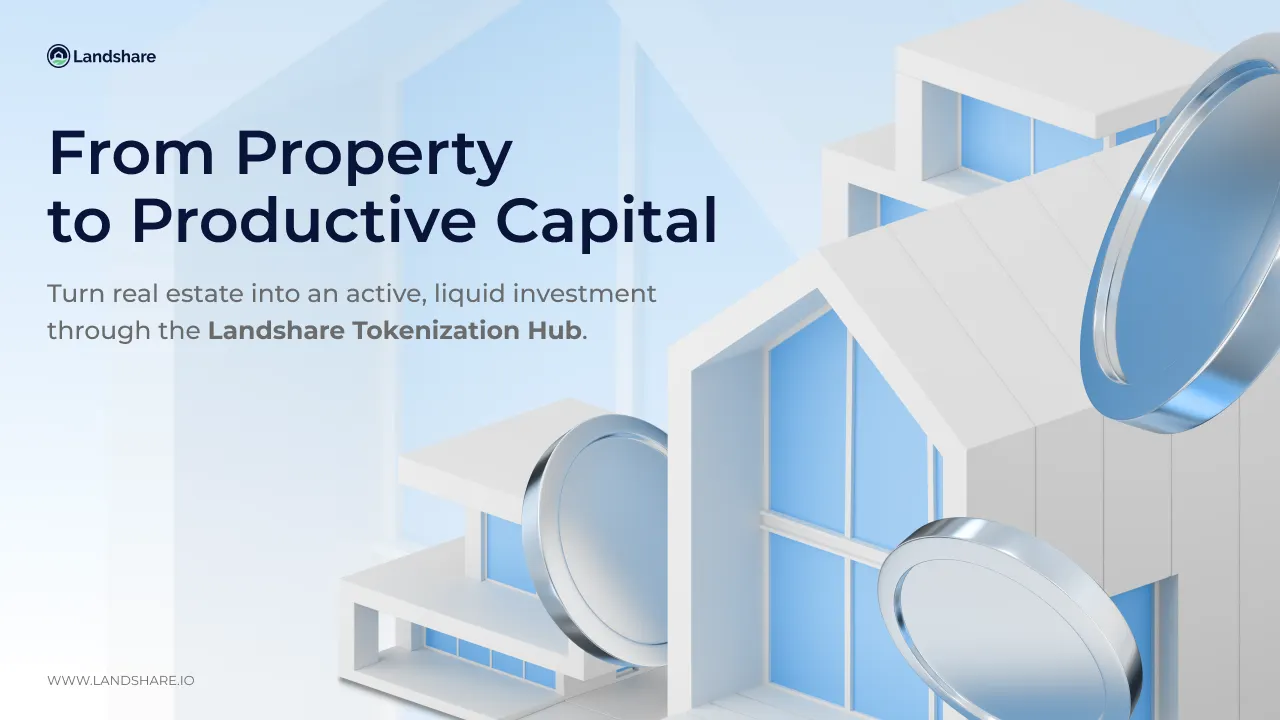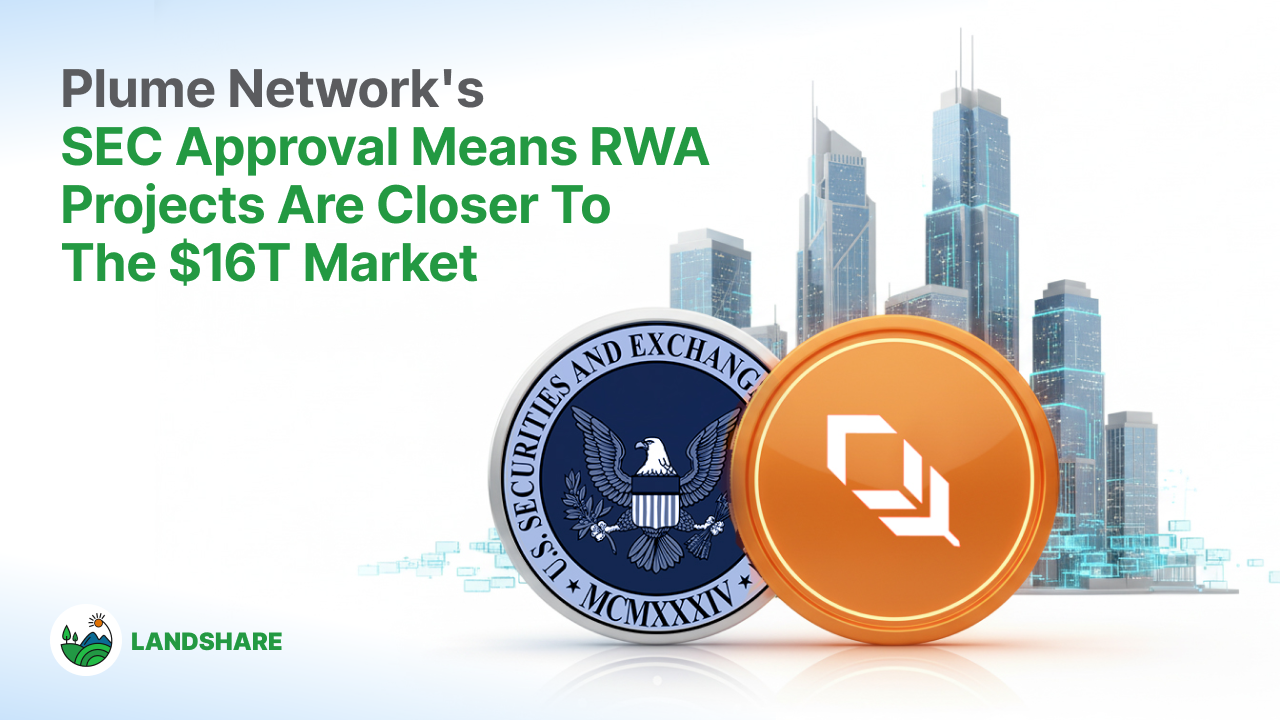Landshare Roadmap: Q1-Q2 2024
Landshare Team

As the year winds down, we’re immensely grateful to our dedicated community members, collaborators, partners, and everyone who has worked with us as pioneers in the RWA space. 2023 was a year to remember for Landshare, and we have even bigger ambitions for 2024!
In this article, we’re capping off 2023 by celebrating the year’s top achievements, outlining our core priorities going forward, and providing a detailed roadmap for the first half of 2024. Let’s dive in!
2023 Highlights
Tokenized House Flip
Early this year, we completed the first ever tokenized house flip, netting a 10%+ ROI in just a few months for our participants. In this process, we transformed a distressed property into something brand new, drastically increasing the property value. You can read about the renovation from start to finish in our Follow the Flip series.
Landshare DAO
This year also marked the launch of the Landshare DAO, which puts high-level decisions into the hands of LAND holders through a decentralized governance model. With this feature, LAND holders can control token emissions, staking rewards, treasury funds, and launch marketing initiatives autonomously.
To learn more about the Landshare DAO and how you can help shape the future of Landshare, be sure to check out our Deep Dive article and the Landshare Docs.
Real World Explorers
At the end of September, we launched an extensive community incentive program with a prize pool of 35,000 LAND tokens. During this period, we achieved 2.5 million impressions on social media, gained 1200 new token holders, received over 3000 registrations on the DS Dashboard, and welcomed several thousand new followers on X and Telegram community members.
This Friday, December 29th, we officially conclude the Zealy Sprint, marking the completion of the Real World Explorers program. The top 215 leaderboard participants will receive delightful New Year gifts from a 4,000 LAND prize pool.
We thank each explorer for their contributions and eagerly anticipate the opportunity to share what we have in store for the Landshare Shill Army.
Landshare RWA Token
To finish 2023 with a bang, we released our most ambitious update yet — the Landshare RWA Token!
With this new token, we’ve fundamentally reimagined our tokenization model, establishing a simple and secure way to gain exposure to real estate directly on-chain. Along with the new Token, we’ve introduced on-chain property valuations via Chainlink, new secondary trading market options, a UI/UX overhaul, and substantial improvements to the NFT ecosystem.
For more information about the RWA Token Update, be sure to check out the following resources:
- Landshare RWA Token: Utilities and Tokenomics
- Feature Preview: Landshare RWA Token
- How to invest in real estate with Landshare
2024 Roadmap
With the final days of 2023 ticking away, we’re setting our sights on the agenda for the new year. We have established 4 Core Priorities for 2024, each of which will guide our decisions throughout the year. Our roadmap is built as an extension of these priorities, with each item serving to advance one or more of them.

- Increased accessibility & integration: Making it easier to access Landshare’s core features; providing additional value through new partnerships and listings
- Visibility & Community Engagement: Spreading the word about Landshare; leveraging the power of our community to assist in those efforts; creating opportunities for the community to provide direct and actionable feedback
- Feature development & app improvements: Continuing to build upon and improve our existing features; developing new features which improve the usability and utility of the LAND and LSRWA Tokens
- Property expansion & diversification: Seeking new opportunities in the real estate space, providing RWA Holders with a diversified and expanded property pool

Q1-Q2
- New CEX listing
- Cross-chain capabilities
- Landshare Shill Army
- RWA Token listing on DS Swap
- Card payments for LAND and RWA Token
- New property NFTs
- Dark mode for Landshare App
- App improvements and bug fixes
Year-long and Ongoing Updates
- New Properties & Diversification
- Quarterly DAO Voting for Development Roadmap
- Regular Community Townhalls
- Integrations and collaborations with other RWA projects

Over time, we have discovered that the most effective way to increase visibility and engagement with the platform is through grassroots, community driven programs and insightful write-ups from Key Opinion Leaders across multiple platforms. To this end, we’re crafting several new initiatives designed to increase visibility and leverage the power of community.
Landshare Shilling Army
As part of the Real-World Explorer program, we frequently conduct shilling quests where users share information about Landshare, thereby boosting awareness of our updates and events. While this approach has been effective, we recognized the need for a modernized version, and that’s exactly what we’ve achieved with the Shilling Army.

We’re now going beyond mere likes and retweets, delving into more meaningful engagement. We’ve created distinct categories for creatives, influencers, shillers, and a plethora of user-generated content that will be ready to launch in mid-January. More details about this campaign, including information on how to participate and fulfill requirements, will be shared tentatively on January 16. Stay tuned so you don’t miss out.
Key Opinion Leaders
As many influential voices in the crypto space focus in on the RWA narrative, it’s crucial to continue our work with Key Opinion leaders across the crypto space. We are focused on creators who craft well-researched, highly informative content which clearly highlights the benefits of our platform in a way that is accessible to a wide audience.
Landshare DAO Grants
Many of our community members may be familiar with the DAO Grant Program and content creation contests. In 2024, we’ll be doubling down our efforts, engaging community members and up-and-coming content creators to produce high-quality, insightful content across multiple domains.

Next up, we must ensure that the platform’s features are easily accessible and well-integrated with other projects. By breaking down barriers to entry and expanding integrations, we make it easier to get into Landshare and even improve the project’s visibility in the process.
New Exchange Listing
Although decentralized exchanges (DEXes) like Pancakeswap are a backbone of DeFi, many users prefer centralized exchanges as a way to buy and sell tokens. To make it easier for these users to get started with Landshare, we intend to list the LAND token on a new centralized exchange early in the year. This will not only allow us to reach more users, but also improve liquidity and opportunities for existing LAND holders.
Cross Chain Capabilities
As crypto moves to an increasingly multi-chain and cross-chain future, it’s imperative that our platform features are accessible through multiple chains. Cross-chain is one of our top priorities, and has been on the radar for a long time. With our latest platform updates as well as new advancements in cross-chain protocols, we have finally established a clear path towards a multi-chain Landshare ecosystem.
With cross-chain comes multiple benefits, including new partnership opportunities, wider access to platform features, and enhanced security. As one of our top priorities for H1 2024, we will continue to provide updates on the development of this feature, including a deep dive article in the coming weeks.
RWA Token Listing on DS Swap
After taking a major step forward with on-chain valuations [link] and fixed price liquidity for RWA Tokens, we will further expand secondary market options with a DS Swap listing for LSRWA. DS Swap will enable the exchange of LSRWA in an active secondary market, similar to Pancakeswap or Uniswap.
Card payment options
Funding a Web3 wallet like Metamask can be a major hurdle for DeFi newcomers. In order to smooth out the onboarding process, we intend to enable credit and debit card payment options for the LAND Token.

Our development will also be hard at work crafting new features and updates for the Landshare App. In addition to some new features yet to be announced, here are the top priorities for our development team entering in the new year.
NFT Migration & New NFTs
In the very near future, we will be completing the NFT migration process for existing NFT holders. With the new system, RWA Token Holders will be stack multiple NFTs for a single yield multiplier against their staked RWA Tokens.
Shortly thereafter, we will release our 3rd NFT for the newest Landshare property, LSCH. With this launch will also come a number of promotions and events designed to bring new users into the Landshare NFT ecosystem. With all 3 NFTs in possession, RWA Token holders can earn 40%+ APR in addition to the gains from rental yields and appreciation!
Dark mode for Landshare App
Dark mode has been a commonly requested feature and was passed via DAO proposal with an 81% vote. Accordingly, we will be launching this feature for the Landshare App early in the year.
App Improvements
Our recent Bug Bounty produced some excellent reports and feedback from the community. Our development team will be hard at work fixing existing bugs and making improvements to the Landshare App based on the feedback provided.
Multi-chain functionality for existing features
Bringing LAND and LSRWA to multiple chains is beneficial unto itself, but far less valuable if key features like staking, governance, and NFTs are not available on those other chains as well. As part of our cross-chain strategy, we will be working to ensure each of our core features has seamless cross chain interoperability, so whether you’re on BSC or another network, everything will work exactly the same.
Quarterly DAO Voting
The Landshare DAO has received several feature requests, and we want to create a streamlined way for LAND Holders to have a direct impact on the development roadmap. Starting at the end of Q1, the development team will assemble all feature requests from the DAO, as well as other ideas from the team or community, and create a single proposal which allows the community to vote for their top priorities.
Unlike a simple Yes/No proposal, the Quarterly DAO Vote will allow you to distribute your voting power across multiple options, based on how important you feel they are. The development team will then assess the results and use them to prioritize development resources, with the top vote-getters receiving special attention. This is a way for the community to provide direct feedback on our development roadmap and request new features for the platform, and a way for the development team to deliver on the community’s top concerns in a timely manner.

Last but not least, our 4th Core Priority is all about expanding and diversifying the real estate offerings for RWA Token holders. By expanding our selection, we not only reduce risk through diversification but also appeal to a wider range of potential investors.
To this point, we’ve focused on single family rentals and house flips. While we do intend to continue investing in these areas, we will be exploring several new options as well. By expanding our selection, we not only reduce risk through diversification but also appeal to a wider range of potential investors.
Some examples we’re exploring include short-term rentals, multi-unit properties, and mixed-use properties. The new RWA Token model also gives us the flexibility to try different strategies, including fix and hold projects or appreciation plays. Each type of investment comes with its own pros and cons, so we’ll continue to assess the market to find the best fit for our investors.
Closing Thoughts
As the RWA narrative captivates the crypto landscape, our sights are set on a new year marked by extraordinary growth. This roadmap serves as a launchpad for what lies ahead, and we invite you to join us at our Community Town Hall on December 29th at 12 PM CST, and be sure to submit your questions here. Your insights will help shape the future, so let’s unite and propel Landshare to new heights in 2024 — our biggest year yet!
Follow Landshare:
Twitter | Medium | Youtube | Telegram | Telegram Announcements | Coinmarketcap | Zealy
Landshare October Recap
Landshare Team
October was a milestone month for Landshare – one that set the stage for the next era of on-chain real estate. From the official Landshare v2 announcement to new ecosystem updates, governance decisions, and exciting community initiatives, we’ve laid the groundwork for a future defined by growth, utility, and innovation.
This month, we introduced the framework that will redefine how investors, property owners, and DeFi users interact with real estate on-chain. Let’s recap the highlights 👇
Landshare v2 Announcement
The official unveiling of Landshare v2 signaled the start of a new chapter – one built around real utility, real yield, and real scalability.
Landshare v2 isn’t just an upgrade. It’s the foundation of a self-sustaining ecosystem where tokenized real estate finally reaches its full potential. The new system transforms stable assets into active yield-generating opportunities, seamlessly connecting traditional markets to DeFi.
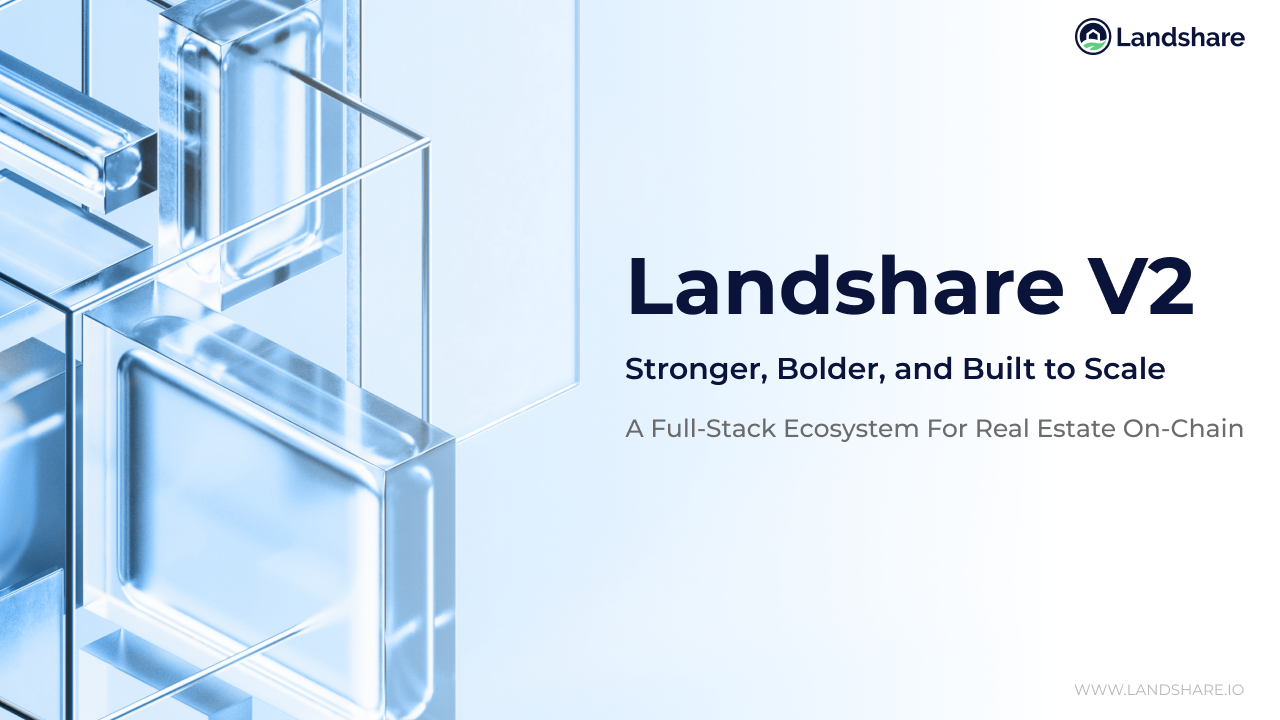
The Three Pillars of Landshare v2
In our follow-up deep dive, we explored the three core pillars that form the foundation of Landshare v2:
- The Real Asset Vault (RAV): A seamless gateway for stablecoin holders to earn real yield backed by tokenized properties.
- The Tokenization Hub: A complete solution for property owners to bring their assets on-chain.
- The DeFi Suite: Tools and incentives that amplify participation and utility across the ecosystem.
Together, these pillars create a self-sustaining growth loop, where every user and property strengthens the entire network.
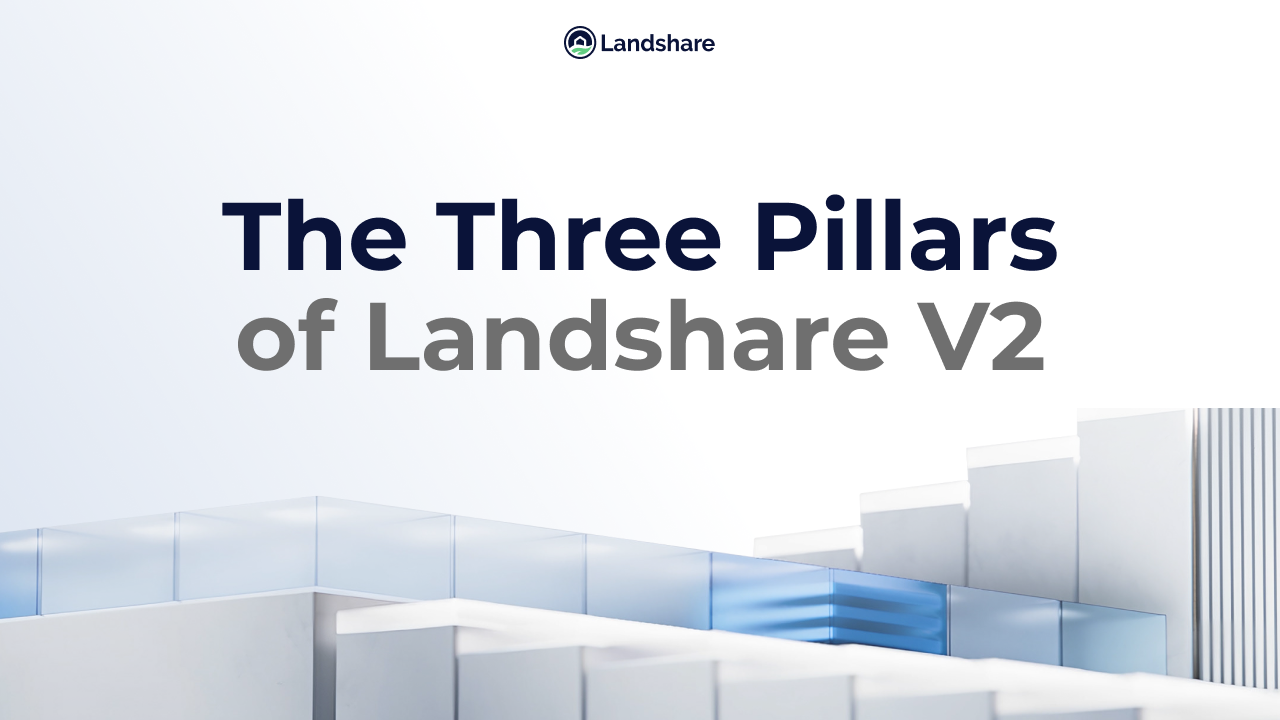
DAO Proposal Passed
In late October, the community voted to reduce LP emissions by 50% across both the LAND–BNB and LSRWA–USDT pools – with the proposal passing at 62.28% in favor.
This important step helps:
✅ Reduce daily LAND inflation
✅ Strengthen token scarcity and price stability
✅ Extend the reward pool lifespan
✅ Encourage long-term liquidity participation
The change will take effect within 48 hours of approval and marks another move toward a more balanced, sustainable economy for Landshare v2.
🗳️ View the full proposal and results
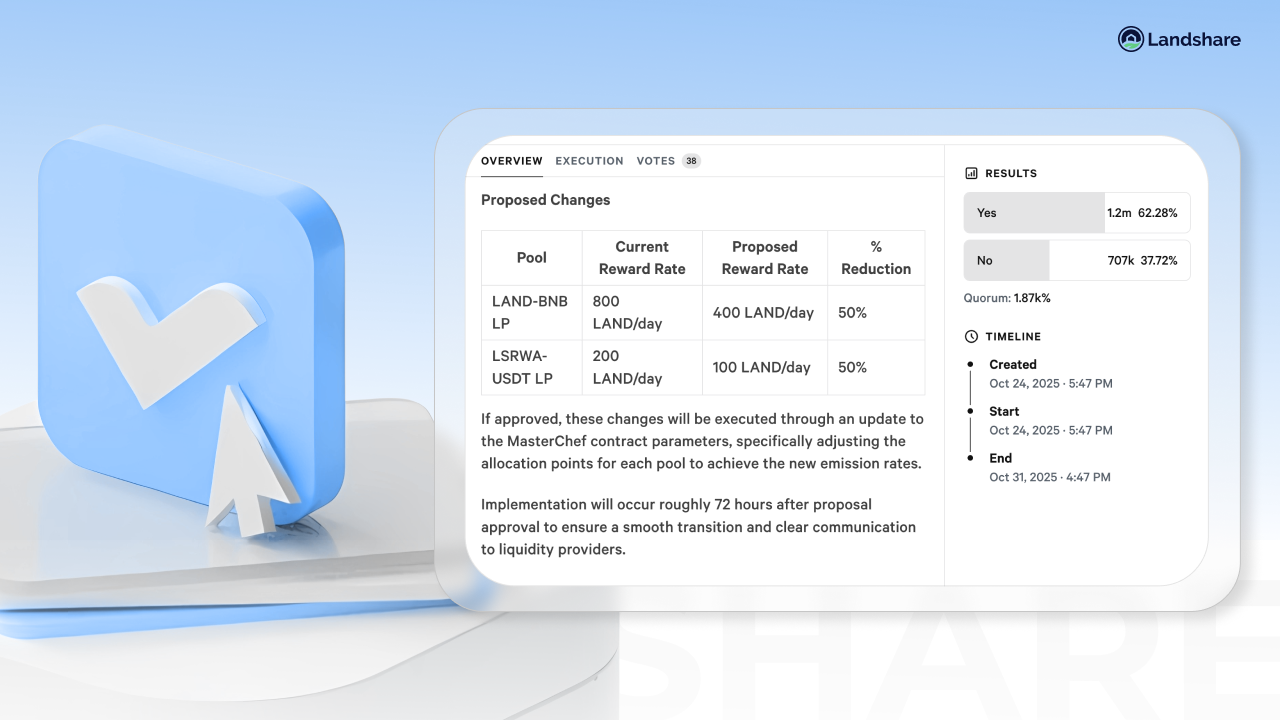
Tokenization Hub Breakdown
We released a comprehensive guide to the Landshare Tokenization Hub, explaining how property owners can now go beyond simple tokenization to access real investors, liquidity, and on-chain utility.
The Hub bridges traditional real estate with blockchain finance – creating a pathway for real-world assets to generate ongoing yield, transparency, and accessibility.

4.5M+ LAND Staked
October also marked another key milestone – over 4.5 million LAND tokens (nearly half of the total supply) are now staked in vaults. This incredible community achievement reflects growing confidence in Landshare’s long-term vision and token utility.
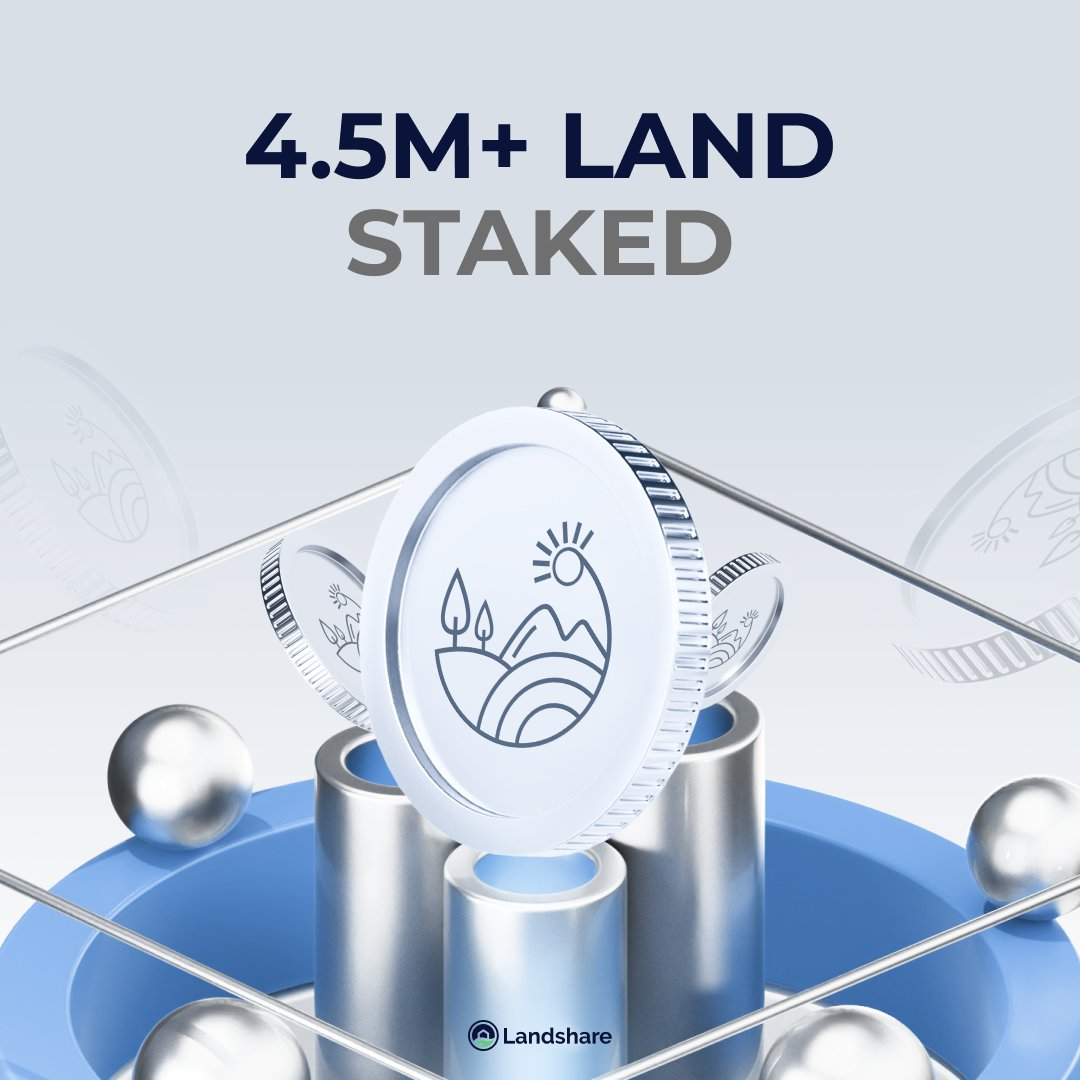
Community Townhall Incoming
We’re excited to announce our next Community Townhall, happening Thursday, November 6 at 12 PM CST or 6 PM CET on X Spaces!
Join Jordan (CEO), Travis (Co-Founder), and Ivan (CMO) as they discuss everything happening with Landshare v2, recent DAO proposals, and take your questions live.
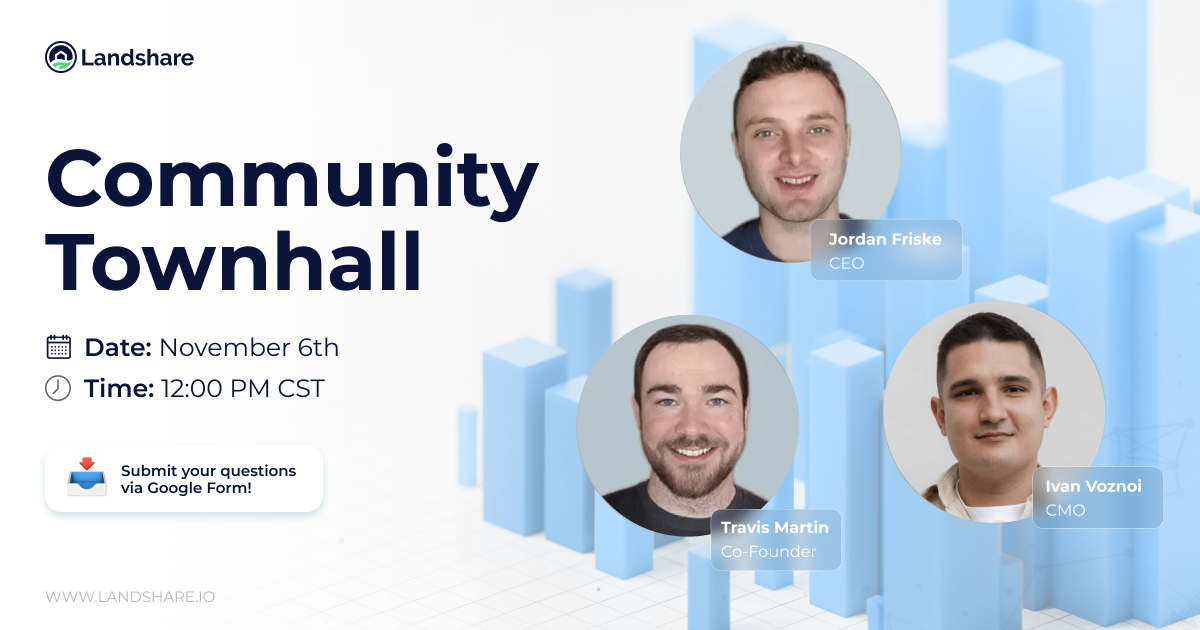
Looking Ahead
With Landshare v2 on the horizon, the foundation is set for a new phase of growth and adoption. In the coming weeks, we’ll be sharing more details on the RAV launch, the Points Campaign, and other major milestones driving our ecosystem forward.
Stay tuned – the future of real estate is being built on-chain, and we’re just getting started.
Tokenization Hub Breakdown
Landshare Team
Real estate tokenization has been a buzzword for years. Yet in practice, most projects have failed to move beyond press releases and empty promises. Too often, blockchain has been used as a veneer to package illiquid or low-quality assets, leaving investors with tokens that serve little purpose and property owners with no meaningful results.
Without investors, liquidity, or secondary markets, tokenization becomes little more than an on-chain spreadsheet — a digital record of ownership that no one can trade or invest in. For property owners, that means time and money spent “tokenizing” without achieving key goals: raising capital, expanding visibility, or unlocking value.
A Smarter Path Forward
For real estate tokenization to truly work, it needs to deliver tangible investment outcomes. After years of building and refining on-chain real estate products, Landshare has developed a model designed to do exactly that.
The Landshare Tokenization Hub transforms tokenization from a passive concept into an active investment process — connecting high-quality properties with real investors, liquidity pathways, and a live blockchain economy.
The Tokenization Hub Solution
Most platforms stop once a token is created. Landshare’s Tokenization Hub goes further , offering a complete pathway for property owners to bring their assets on-chain and immediately engage investors.
Each project is structured for success from day one, with:
- Customized tokenization models tailored to each property
- Transparent fundraising mechanics with defined soft and hard caps
- Built-in integration with the broader Landshare ecosystem
By connecting directly to Landshare’s existing network of investors and DeFi infrastructure, offerings can attract participation as soon as they launch. Once a fundraising goal is met, property tokens are deposited into the Landshare RWA Pool, linking them to ongoing liquidity, yield mechanisms, and secondary market exposure.
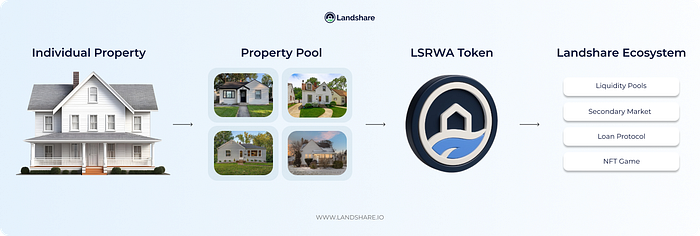
Why This Model Delivers Real Results
Where others leave property owners to manage marketing, compliance, and liquidity alone, the Tokenization Hub handles these as part of a unified process. This integration dramatically increases the likelihood of meeting fundraising goals and sustaining long-term engagement.
Integration with the Landshare RWA Token (LSRWA) is central to this model. Rather than isolated tokens with no market, each property becomes part of a shared, liquid environment that generates yield and investor participation. Individual assets can still be represented, extracted, or traded independently when needed.
For example, a multifamily property owner might tokenize 20% equity to raise $500,000 on-chain, connect the asset to the RWA Pool for ongoing yield, and maintain full transparency for investors — all within a compliant, accessible framework.
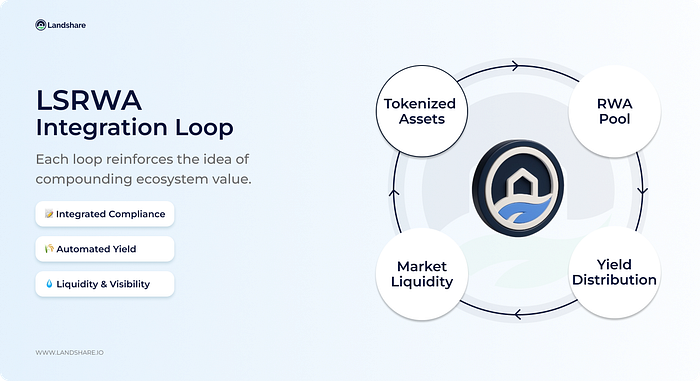
How It Works
- Tokenize the Property: Landshare collaborates with property owners to create a digital representation of equity, income rights, or hybrid participation.
- Launch the Offering: The property is listed on the Tokenization Hub with defined terms, caps, and transparent investor access.
- Fundraising & Validation: Investors participate directly on-chain. Once the soft cap is reached, funds are secured and the offering is finalized.
- Ecosystem Integration: Tokens are deposited into the Landshare RWA Pool, and investors receive LSRWA tokens representing pooled value and yield potential.
- Ongoing Value Creation: Property owners gain lasting benefits through liquidity, visibility, and investor engagement. As new assets are added to the pool, owners can rebalance between equity and cash, making real estate a more dynamic and liquid asset than ever before.

Built for Real-World Impact
The Landshare Tokenization Hub is more than a technical service — it’s a complete ecosystem designed to make real estate investment active, liquid, and accessible.
For property owners, it offers a streamlined way to raise capital and connect with global investors.
For investors, it provides exposure to yield-generating, on-chain assets backed by transparent real-world value.
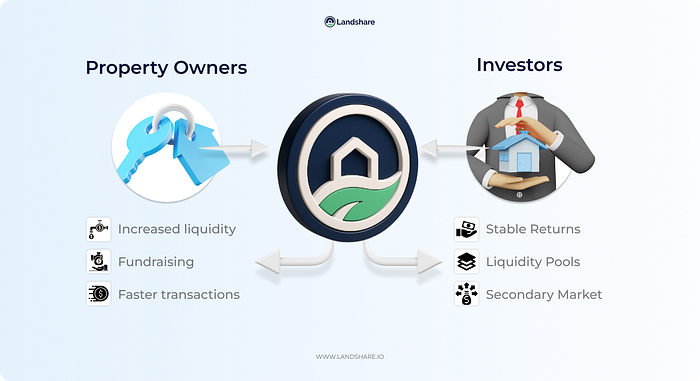
In an industry crowded with static tokens and overhyped promises, the Tokenization Hub delivers what tokenization was always meant to achieve — real outcomes, real liquidity, and real-world results.
🏡 About Landshare
Landshare is a tokenized real estate ecosystem that enables seamless investment in real-world assets on the blockchain. With Landshare, you can own a share of a real-world property simply by holding our RWA Tokens ($LSRWA). Our platform offers a secure, transparent, and efficient way to invest in real estate without traditional barriers.
- Website: landshare.io
- Twitter: @Landshareio
- Community: t.me/landshare
Plume Network's SEC Approval Means RWA Projects Are Closer to the $16T Market
Landshare Team
On October 6, Plume Network announced on its social media that it had been approved to be an SEC-registered transfer agent. This is a big milestone for the RWA industry, signaling that the traditional financial system is welcoming tokenized assets.
Transfer agents basically manage important back-end work and are the official record-keepers for securities issuers. So, essentially, they maintain shareholder registries, record ownership changes, issue certificates, and handle other corporate actions.
Plume’s approval means these critical functions can now be managed on-chain for tokenized securities. This is a pretty big deal, as it gives Plume and its users formal regulatory standing under U.S. law for on-chain securities.
Experts believe that this approval can boost the global RWA market, and top players like Landshare can benefit from it due to the increased regulatory clarity.
Why is the SEC’s Approval Important for Plume Network?
So, first, understand the roles of a registered transfer agent to get a better understanding of its importance.
In traditional finance, a transfer agent is usually a company or bank that tracks who owns a company’s securities and facilitates trades. They ensure every share transfer, stock split, or dividend payment is accurately recorded and reported. Now, let’s understand how this traditional role will work in the world of blockchain.
Post Link
By replicating these roles on-chain, Plume’s platform can securely log every token sale or dividend distribution in an immutable ledger, while also syncing with regulators. As Plume explains, its transfer-agent protocol will “link cap tables and reporting directly to SEC and DTCC systems”.
This means tokenized equity and debt on Plume can behave like traditional securities, but will be managed better with the help of blockchain technology.
Plume’s CEO believes that this regulation “exists to protect investors’ rights as shareholders,” and Plume’s on-chain solution is meant to simplify the processes under that framework.
Its Impact:
Experts believe that the registration will open up several doors for the RWA market because of the ‘trust factor’. Being registered means there are no risks as far as legality is concerned. When an industry or its top player receives a green flag from the government regulatory agencies, institutional capital follows.
BlackRock, Fidelity, JP Morgan, etc., are already looking to build blockchain-based products. This will further invite them to join the RWA growth story and possibly super-boost it.
Moreover, another important benefit is that tokenized securities can now flow through compliance obstacles. This means issuance times can be cut from months to weeks with the help of smart contracts. Similarly, on-chain dividends and ICOs can enjoy the same legal protections as Wall Street offerings.
What Does This Mean For The RWA Market?
Plume’s win comes at a time when analysts are already forecasting a massive growth in tokenized RWAs over the next decade. Institutions now value tokenization as a way to digitize everything from private credit to real estate. Also, the numbers are pretty optimistic as well.
A Boston Consulting Group report estimated the global asset-tokenization market could reach about $16.1 trillion by 2030. The industry has already grown by almost 380% in the past three years. To put things into perspective, today’s entire crypto market cap is smaller than those figures. Even some of the more conservative forecasts still show multi-trillion growth.
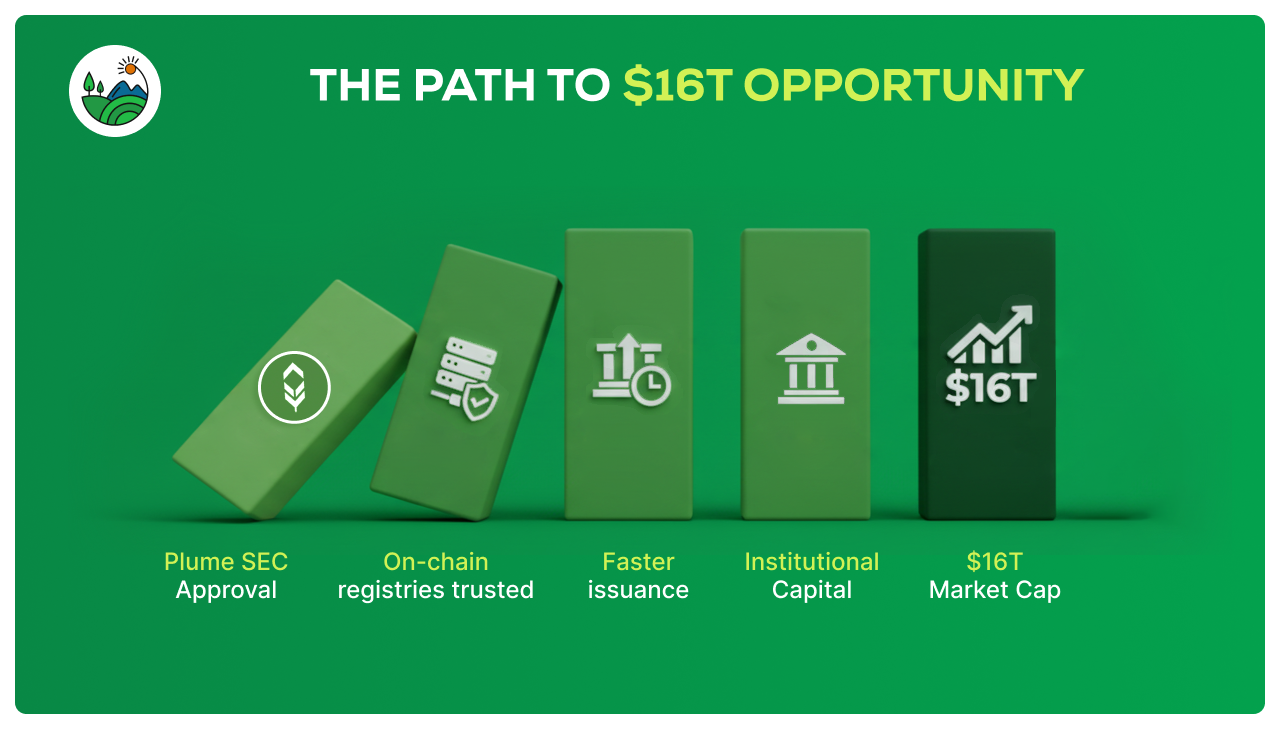
If these estimates can materialize in the days to come, RWA is well-positioned to be one of the largest markets in the world of modern finance.
Moreover, the external conditions are favoring this industry. Governments and regulators worldwide are creating proper frameworks. For instance, Asia-Pacific markets are running pilots for digital bonds and crafting standardized rules for security tokens.
These developments and the excitement of retail investors in this category build confidence that the $16T opportunity is actually very real.
How Will Landshare Benefit From This?
Landshare stands at the forefront of benefiting from this opportunity because of its early entry and real-world utility. This is very important as institutions seek new projects that have use cases that can help them capture a considerable market share.
Moreover, Landshare already operates as a compliant RWA platform. For instance, each Landshare RWA Token (LSRWA) is a security token representing fractional shares of a U.S. real estate portfolio, and buyers must pass KYC/AML checks.
The fact that regulators are now approving on-chain transfer agents shows the industry’s efforts are finally paying off. Here are some more factors that can help Landshare be one of the top RWA contenders:
1. Regulatory Credibility: Plume’s SEC status essentially means that tokenized securities can operate within established rules. Landshare’s approach aligns with these principles. So, investors can be assured that their projects sit within a legal framework designed to protect shareholders.
2. Investor Confidence: Every step toward clear regulation lifts confidence. The recently passed GENIUS Act, the SEC’s staff statements on liquid-staking, and the Trump administration’s overall outlook towards the crypto market have been fairly positive.
Similarly, Plume being approved as a SEC-registered blockchain transfer agent tells retail and institutional investors that projects like Landshare aren’t mere experiments. They’re rather a part of a regulated financial evolution.
Moreover, it means regulators see value in on-chain tokens, and that kind of signal helps legitimize the space Landshare operates in.
3. Landshare’s Own Progress: Landshare isn’t about hype. It is rather focused on delivering value from day one. The project has already sold four houses on the BNB chain. It is also providing consistent rental returns to the investors in its properties.
Moreover, the team remains focused on delivering stable, compliant returns from real estate growth.
Conclusion
So, now we know that the recent news was about more than just Plume Network being approved by the SEC to be a transfer agent. It rather has a much bigger impact on the RWA market as a whole.
While the industry continues to grow, for Landshare, it is the right time to innovate further and add more value to consumers’ lives.






